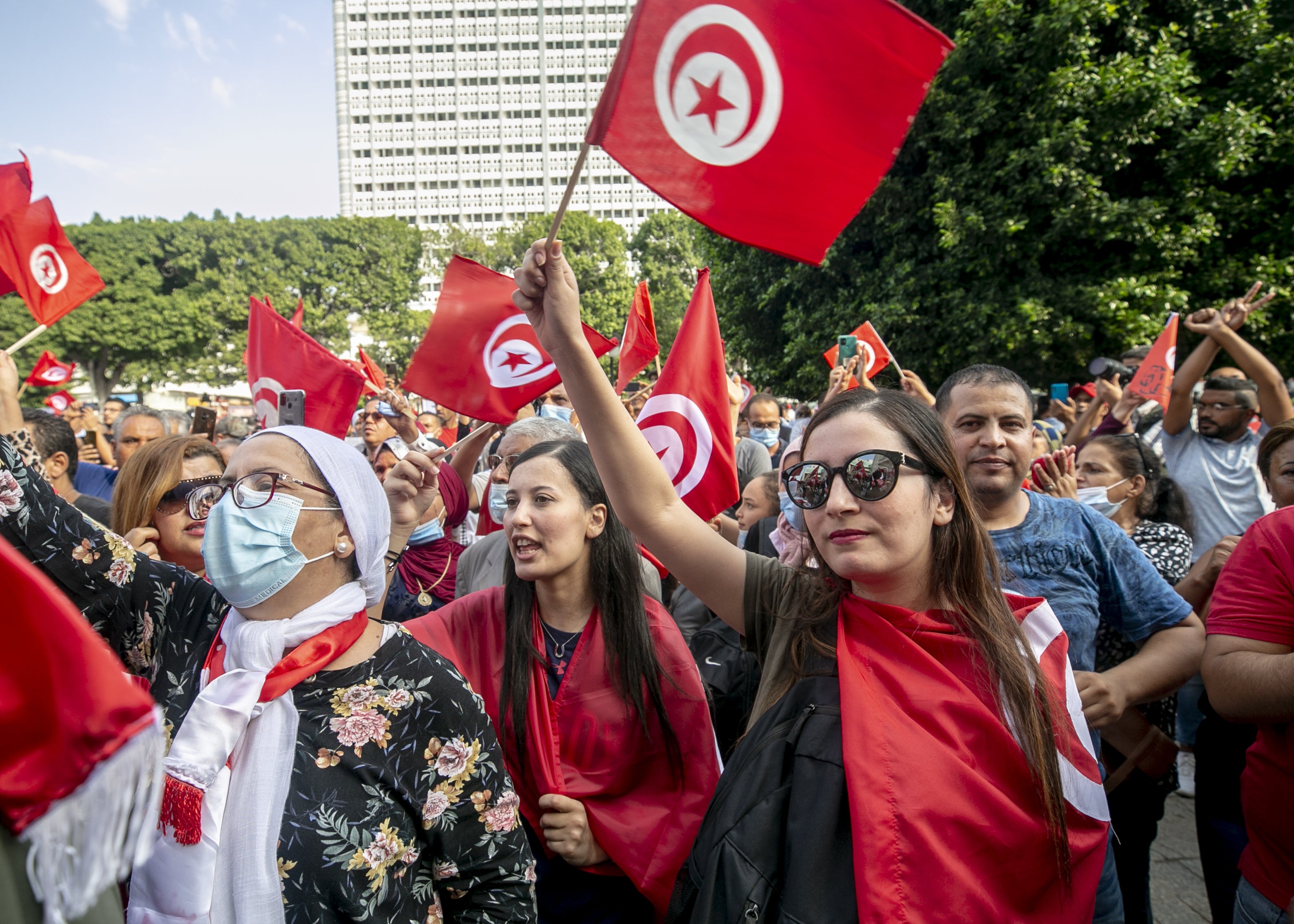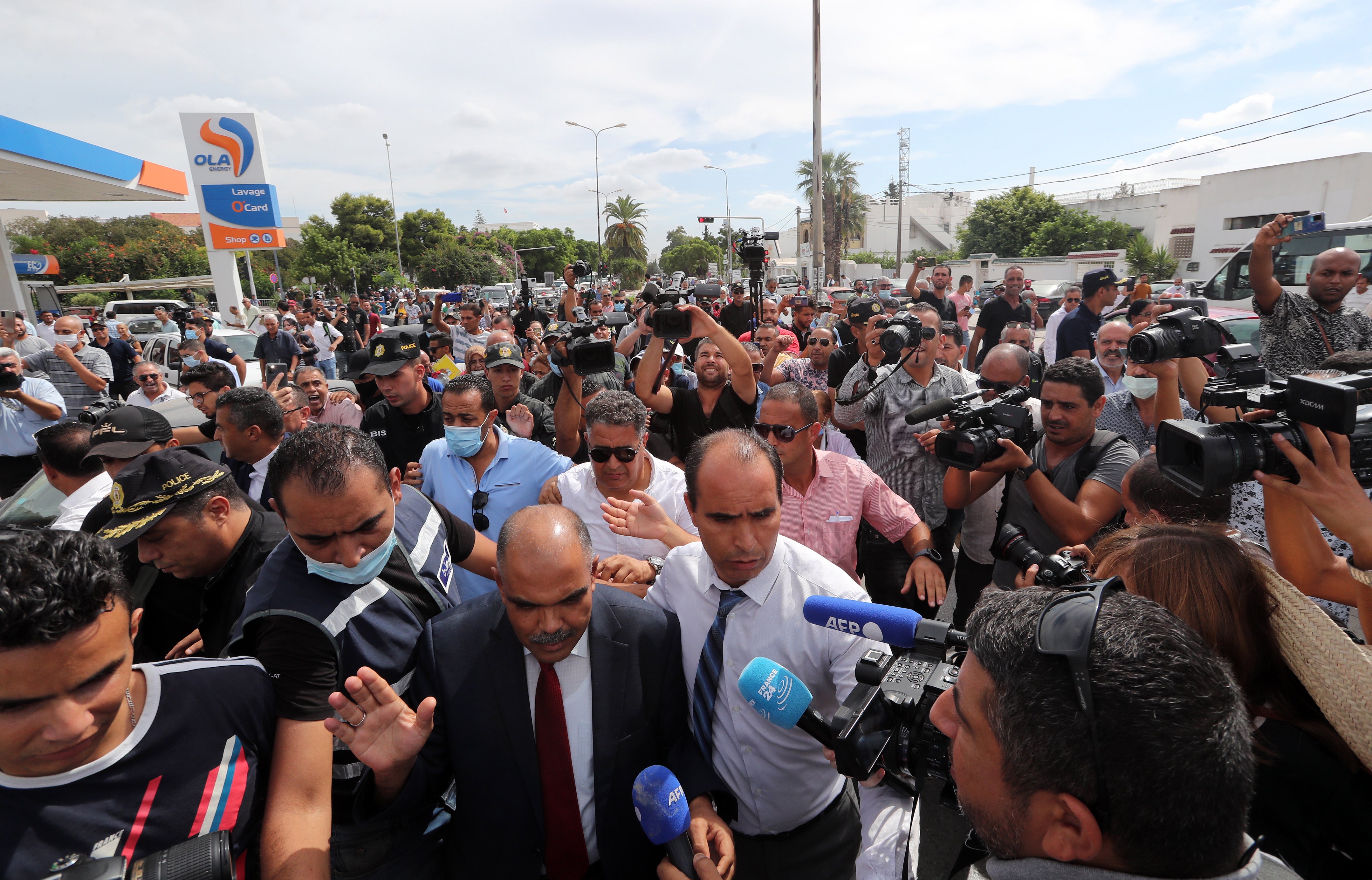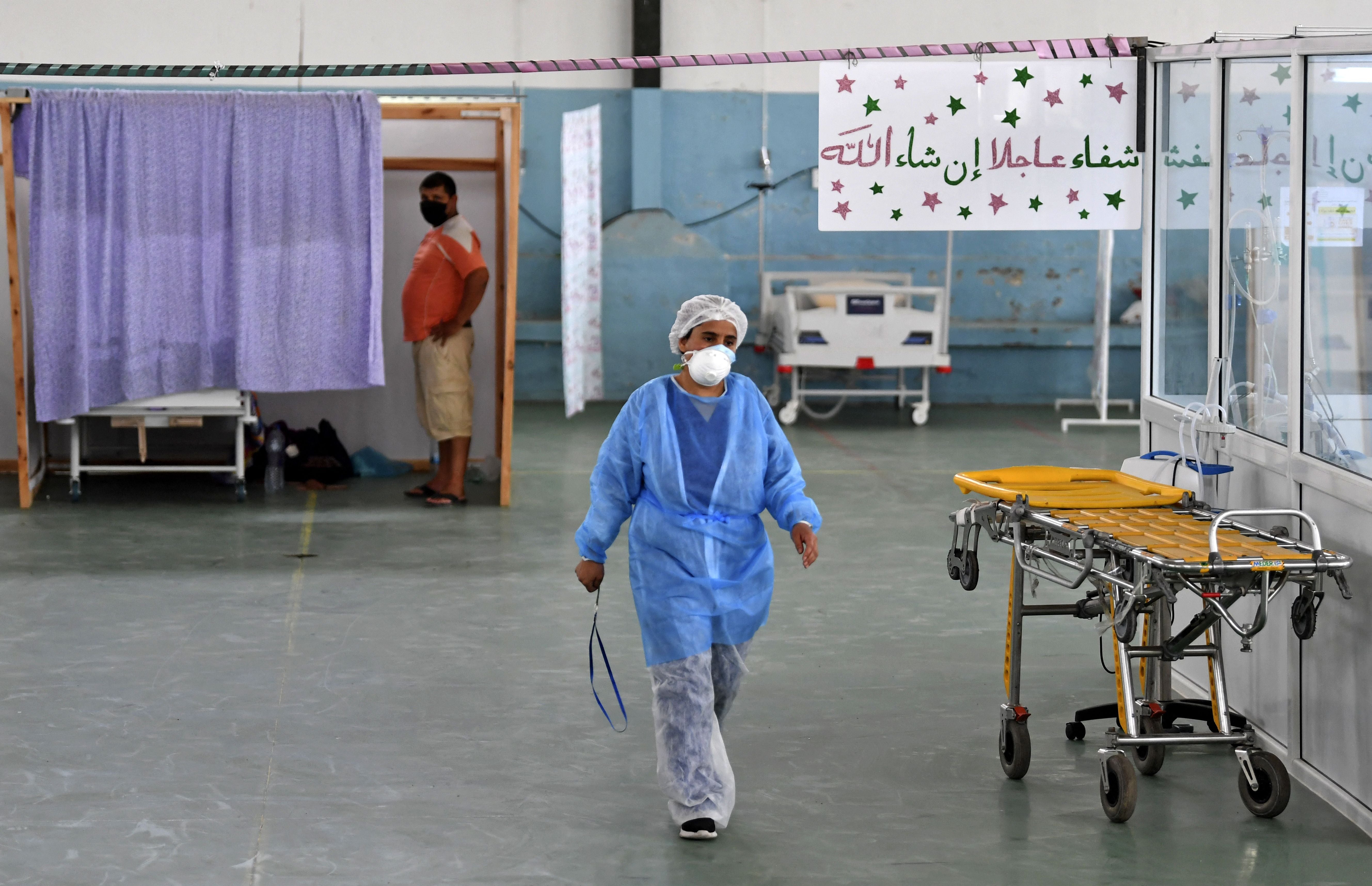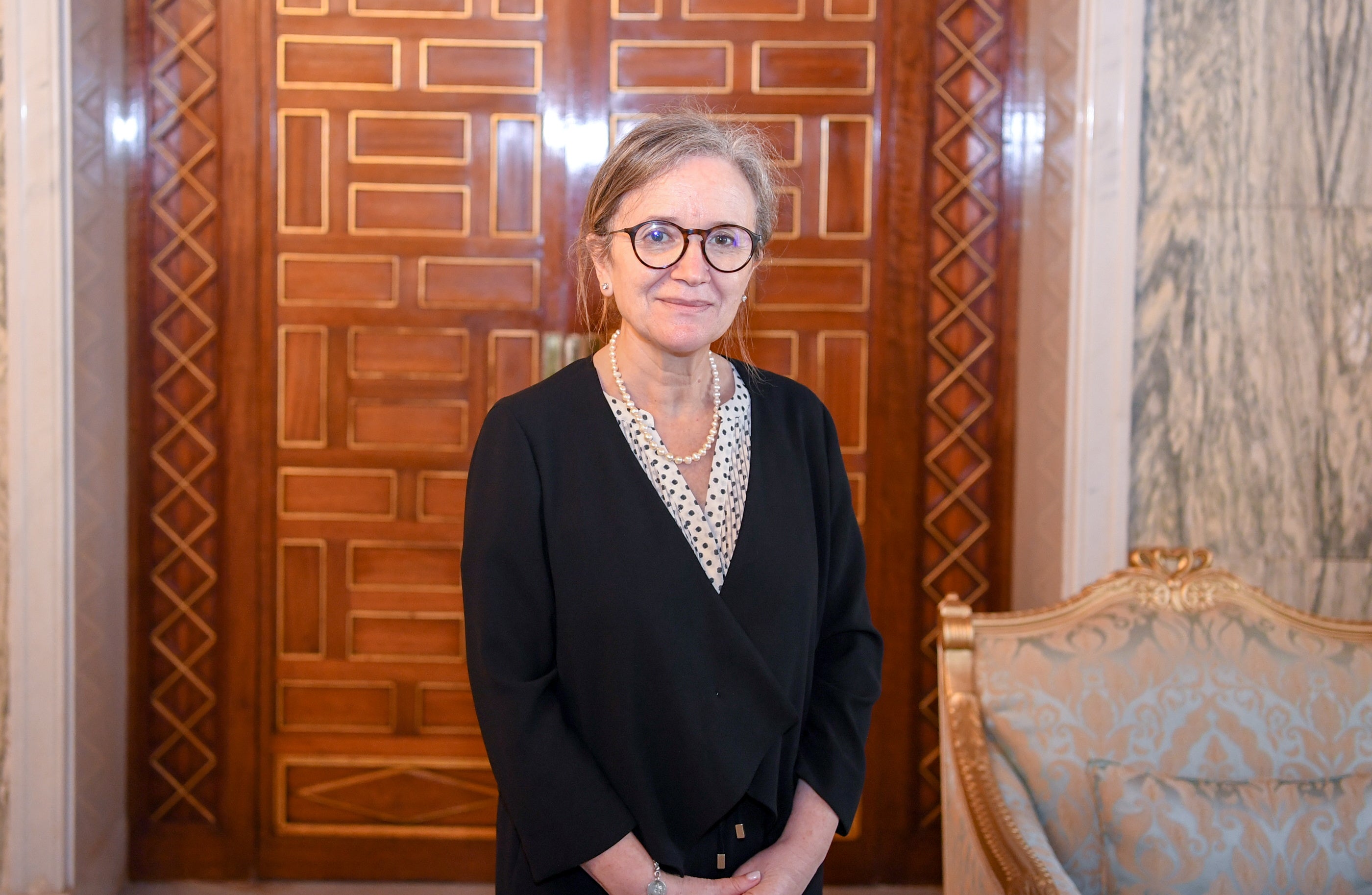‘For now people are happy’: the Tunisian president’s strong public backing belies deeper problems
The wind may be blowing in President Saied’s favour, writes Simon Speakman Cordall, but his lack of an overarching plan to tackle economic woes, unemployment and widespread corruption will pose problems

They came out in their thousands, some travelling from across Tunisia to lend their support to the president on Sunday.
On Avenue Habib Bourguiba in central Tunis, as in towns throughout the north African country, people came onto the streets to chant their support for the president and make clear their absolute rejection of the country’s parliament and the corruption there that they felt held sway.
In so doing, they threw their lot in with the president, Kais Saied, a political outsider and university professor whose 25 July power grab marked an end to the political status quo and a dramatic curtailing of the tired phrase, “the sole success of the Arab Spring.”
For many Tunisians over the last decade that label has deflected from a worsening economy and a never-ending series of political crises, with a new class of politicians and ministers emerging from the rubble of the 2011 revolution, who appeared more interested in political positioning and squabbling than running the country.
While the president has his supporters on the cities’ streets, almost as numerous are the parliament’s detractors, willing to trust in any measure that will see an end to the infighting and positioning that has competed for headlines against entrenched unemployment, social unrest and protest.
Kais Saied’s hostility to party politics and the political system as a whole should come as a surprise to no one. In 2019, he was elected to the presidency on the back of an unambiguous anti-corruption, anti-system mandate – the two being synonymous in the minds of many – securing a landslide with 73 per cent of the runoff vote.
I supported him from the 25th. He’s independent in his decisions. He works by himself and because he abolished parliament and [self-styled Muslim Democrats] Ennahda
In terms of voter numbers, in the final tally, his personal count almost eclipsed those lent to all parties of the parliament. Irrespective of the slow pace of change and the muddled signalling since 25 July, the country remains with him, a fact underscored by a series of notoriously wobbly polls, which have all suggested overwhelming support for the president’s position, including his assumption of government by decree.
In numerical terms alone, the show of support for the president on Sunday, while far short of the 1.8 million he would later erroneously claim had turned out, still dwarfed two preceding protests. Then, demonstrators gathered in the capital to echo the calls of rights groups and the international community in demanding a return to constitutional legitimacy and the re-establishment of parliament, an appeal largely rendered void by the Mr Saied’s September dismissal of entire swathes of the country’s 2014 constitution.
Standing next to the former Currency Museum in central Tunis, 30-year-old factory worker Ahlem Talbi explained much of the president’s appeal. “I supported him from the 25th. He’s independent in his decisions. He works by himself and because he abolished parliament and [self-styled Muslim Democrats] Ennahda.”

Rightly or wrongly, in many people’s minds Tunisia’s most successful political party since the revolution has become synonymous with government itself and, by extension, responsible for many of its failings.
Ennahda has played significant roles in nearly all of the nine governments in Tunisia over the last decade. As rival parties have come and gone, ironically often after making deals with Ennahda, the Muslim Democrats have endured, often at the expense of their own withering support.
Throughout this time, living conditions across Tunisia have deteriorated, while the chasm between capital and coast – along with the country’s widespread corruption and endemic unemployment – remains.

In 2010, unemployment stood at around 13 per cent. Today, that figure has increased to just under 18 per cent. In 2010, the national currency, the dinar, was worth 1.44 against the US dollar. Today, you will need nearly 3 dinars to buy one dollar. As the currency has shrunk, the cost of living has increased and, on the streets of Tunis at least, parliament is getting the blame. What few stuttering causes for optimism remained were all but wiped out by the pandemic.
In the spring months of 2021, after years of neglect and underfunding, the government conceded that its health service had collapsed under the weight of one of the highest per capita mortality rates within the Mena (Middle East/north Africa) region. A bungled vaccine roll that left thousands standing in the fierce July sun, ultimately resulting in little but frustration and scuffles, did little to reassure a fretful public that their elected representatives truly had their interests at heart.
“For now, people are happy,” Youssef Cherif, the head of the Columbia Centre in Tunis said, “the threat from Covid’s receded and they’re not really feeling any economic pain yet.” As before, much of the reasons for the president’s support lay not so much with the man himself as with a rejection of a parliament that has done little to cover itself in glory.

“Before 2011, many people didn’t even know we had a parliament and after that it’s all everyone’s talking about,” Cherif said, “Over the last 10 years, they’ve seen many relatively new politicians emerge and use their positions for corrupt ends. The parliament looked like the politicians’ playground, not the people’s assembly,” he stressed.
With many politicians from across Tunisia marooned in the capital and unwilling to engage with their electorate, faith was at a premium. “They can’t be reached, nor do they respond to their voters’ concerns,” he said. “However, let’s not forget the economic system,” Cherif continued, “it hasn’t really had a mention in any of this. We’re still dealing with Covid, yet the focus has all been about Saied’s political ends.”
Irrespective of its governance, Tunisia’s economic direction of travel was established years ago and its trajectory remains grim. Every winter, occasionally violent protests erupt across Tunisia’s marginalised hinterlands, as frustration over living conditions and lack of employment boils over into protests by young people who dare to confront the country’s brutal police force.
We know he doesn’t particularly like [elections], or the kind of politician they produce. He’ll prefer to continue as he is
In previous years, responsibility for both the cause for confrontation and the police’s violent response has been laid at the feet of government. Needless to say, having made no substantive mention of jobs, though having made a very public assumption of power over both the country and its security services, President Saied must be hoping for a peaceful winter.
How long Tunisia can continue on its present track is unknown. President Saied has given no indication of any overarching plan. One week ago, he tasked fellow academic and political neophyte Najla Bouden Romdhane with forming a government. No timeline was given and the press release did not even specify her job title.
“I don’t think we’ll see fresh elections anytime soon,” Cherif said. “We know he doesn’t particularly like them, or the kind of politician they produce. He’ll prefer to continue as he is,” ruling directly from Carthage, “until the economy and foreign donors leave him little choice but to stage them.”
For now, the wind is in his favour. All the same, President Saied should proceed cautiously. Caesar was popular once, too.






Join our commenting forum
Join thought-provoking conversations, follow other Independent readers and see their replies
Comments